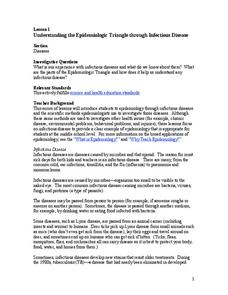Advocates for Human Rights
The Right to a Clean Environment: Water
First, young citizens learn about water consumption by doing some research themselves on their home water usage and sharing their findings with the class. Then, they do some brainstorming and devise a plan to reduce water consumption.
Kenan Fellows
Making Connections with Water Quality
What's in your water? And, why is water quality so important? Enhance your class's level of water appreciation through a lesson that demonstrates the necessity of water quality. Environmental enthusiasts explore the EPA's Clean Water...
Curated OER
What Does Earth Day Mean? - Biology Teaching Thesis
Young scholars possible sources of water pollution, and explain the effects that water pollution can have on the food on the food chain. They Name human and other animal (i.e. fish) illnesses that can be contracted from drinking polluted...
Curated OER
One Kid Can Make A Difference
Pupils make a pledge to make three positive choices for 30 days and track their progress. In this positive choices lesson plan, students discuss ways in which they can be healthier, protect the environment, be respectful, and more. They...
Curated OER
Earth Day Unit Plan: Pollution in the Anacostia River - Biology Teaching Thesis
Sixth graders are able to explain that there are pollutants in the Anacostia River, what these pollutants can cause, and how to prevent further pollution. They examine the impacts that the pollutants of the Anacostia River could have on...
Curated OER
Our Healthy Bodies
Students complete a variety of activities designed to enhance their awareness of their bodies. They examine pictures of themselves, taken at various points in the year and examine and compare their bodies. They enjoy a healthy snack...
Curated OER
Conservation
Fifth graders examine how destructive fishing practices affect the health of coral reefs. They watch a Powerpoint Presentation, conduct an experiment, and in small groups create a Powerpoint Presentation.
Centers for Disease Control and Prevention
Understanding the Epidemiologic Triangle through Infectious Disease
Introduce infectious diseases and the epidemiologic triangle. A helpful resource describes the agent, host, and environment from the three vertices as well as the time factor, which is in the middle. Scholars complete a simple...
Curated OER
Soda to be Absent from Schools
Should schools serve soda to students? Learners read an artlcle that argues against the sale of soda in schools and engage in a class discussion. They then complete a short assessment to check for comprehension and reflect on the...
Curated OER
Understanding the Epidemiologic Triangle through Infectious Disease
Students examine the epidemiologic triangle. In this disease lesson, students discuss infectious disease as they study how they spread and discover their families' experiences with them. Students research Internet sites to complete...











